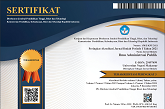Martin Luther King Jr’s Theory of Nonviolence in Conflict Resolution
(1) Department of Philosophy University of Calabar, Cross River State, Nigeria.
(2) Department of Philosophy University of Calabar, Cross River State, Nigeria
(*) Corresponding Author
DOI: https://doi.org/10.26858/jiap.v10i2.17929
Abstract
Keywords
Full Text:
PDFReferences
Alfoqahaa, S., & Jones, E. (2020). Leading at the edge of chaos: historical perspectives on the qualities of leadership for cultural diversity and conflict resolution. International Journal of Public Leadership, 16(2), 217–248. https://doi.org/10.1108/ijpl-10-2019-0065
Alomes, A. (2007). Searching for an exit in the corridor of fear: Revisiting Gandhi and King in times of terror[ISM]. In Nonviolence: An Alternative for Defeating Global Terror(ism) (pp. 31–46).
Bloom, A., & Breines, W. (2003). A Fleeting Wonderful Moment of Community. In Takin’ it to the streets (pp. 508–511).
Edor, E. J. (2020). John Rawls’s Concept of Justice as Fairness. PINISI Discretion Review, 4(1), 179-190.
Edor, J. E., & Ayuk, T. O. (2020). Religious Extremism: A threat to Nigerian Corporate Existence. Journal of the Social Sciences, 48(2).
EYO, E. B. (2016). SERVANT LEADERSHIP AND ITS ETHICAL CHALLENGES. JOURNAL OF INTEGRATIVE HUMANISM VOL 7, (1).
Eyo, E. B. (2019). Advancement of Global Peace Building from the Periscope of Kant’s Philosophy of Perpetual Peace.
Eyo, E. B., & Etta, E. E. (2020). Ubuntu’s philosophy and the challenge of Xenophobia: towards peace in Africa. International Journal of Humanities and Innovation (IJHI), 3(1), 39-43.
Eyo, E. B., & Ojong, F. O. (2008). Peace and conflict resolution as a foundation for national development. Sophia: An African Journal of Philosophy, 11(1).
Eyo, E. B., & Udofia, C. A. (2011). Taxonomy of Methods of Conflict Resolution. Sophia: An African Journal of Philosophy, 13(2), 51-56.
Farrell, N. (2014). From Activist to Entrepreneur: Peace One Day and the Changing Persona of the Social Campaigner. M/C Journal, 17(3). https://doi.org/10.5204/mcj.801
Filice, C. (2008). Understanding World Religions: A Road Map for Justice and Peace. Journal for Peace and Justice Studies, 17(2), 80–83. https://doi.org/10.5840/peacejustice200817215
Gillon, S. M., Bloom, A., & Breines, W. (1996). “Takin’ it to the Streets”: A Sixties Reader. The Journal of American History, 83(3), 1090. https://doi.org/10.2307/2945782
Kuusisto, R. (2009). Roads and riddles? Western major power metaphors of nonviolent conflict resolution. Alternatives, 34(3), 275–297. https://doi.org/10.1177/030437540903400303
Perlstein, D. (2011). The dead end of despair: Bayard rustin, the 1968 New York school crisis, and the struggle for racial justice. In Civil Rights in New York City: From World War II to the Giuliani Era (pp. 118–140).
https://doi.org/10.5422/fordham/9780823232895.003.0007
Ulafor, O. J. (2020). Martin Luther King Jr’s Philosophy of Non-Violence: A Paradigm for Global Black Race towards Conflict Resolution and Peace in Africa. Jurnal Sosialisasi: Jurnal Hasil Pemikiran, Penelitian Dan Pengembangan Keilmuan Sosiologi Pendidikan, 54. https://doi.org/10.26858/sosialisasi.v0i0.13889
Article Metrics
Abstract view : 706 times | PDF view : 161 timesRefbacks
- There are currently no refbacks.
Copyright (c) 2021 Eyo Emmanuel Bassey, Ejesi Edwin

This work is licensed under a Creative Commons Attribution 4.0 International License.
Diterbitkan oleh:
Program Studi Ilmu Administrasi Publik
Program Pascasarjana Universitas Negeri Makassar
JIAP Index By:

This work is licensed under a Creative Commons Attribution 4.0 International License.









